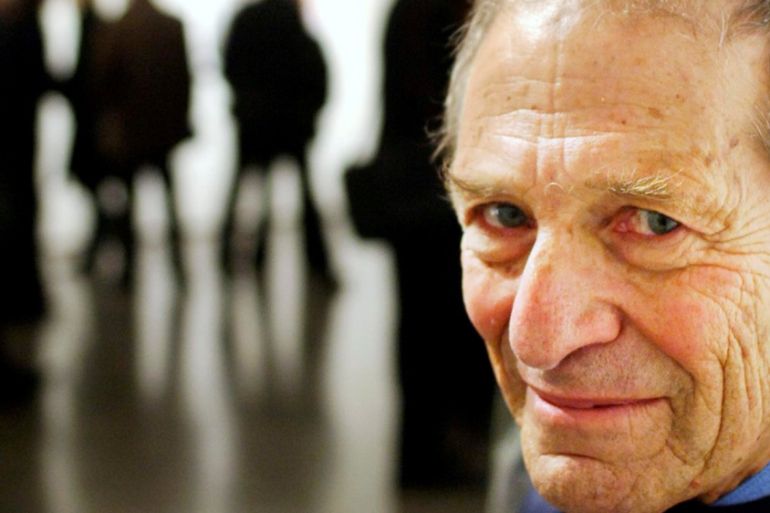David Goldblatt, who documented apartheid South Africa, dies
Acclaimed photographer passes away in his Johannesburg home at the age of 87.

Renowned South African photographer David Goldblatt, whose work documented the abuses and divisions of apartheid, has died aged 87.
“He passed away peacefully in the early hours of this morning at his home in Johannesburg,” Goodman Gallery said in a statement on Monday
Keep reading
list of 4 itemsInside the pressures facing Quebec’s billion-dollar maple syrup industry
‘Accepted in both [worlds]’: Indonesia’s Chinese Muslims prepare for Eid
Photos: Mexico, US, Canada mesmerised by rare total solar eclipse
For millions of people outside South Africa, Goldblatt’s work lifted the veil on the nightmare of apartheid, under which the white-minority government enshrined racial divisions under law from 1948.
Born to Lithuanian immigrants in Johannesburg’s gold reef, Goldblatt documented South Africa’s black population working in mines or travelling under racist laws that restricted their movements, as well as privileged whites at home, along with routine interactions between the races that showed, in his words, how the country’s normality was distinctly abnormal and abhorrent.
“During those years my prime concern was with values – what did we value in South Africa, how did we get to those values and how did we express those values,” Goldblatt once said, according to the Goodman Gallery.
“I was very interested in the events that were taking place in the country as a citizen but, as a photographer, I’m not particularly interested, and I wasn’t then, in photographing the moment that something happens. I’m interested in the conditions that give rise to events.”
In 1988, he was the first South African to be given a solo exhibition at the Museum of Modern Art (MoMA) in New York, United States.
A year later he founded the Market Photography Workshop in Johannesburg, which has since become a hub for developing young talent in the city.
‘National treasure’
In post-apartheid South Africa, he remained a respected figure, his work focusing the inner city lives of middle class residents, both black and white.
“We have lost yet another of our own celebrated photographers, who through the lens built a reputation as one of the country’s leading documenters of the struggles of our people,” President Cyril Ramaphosa said in a statement.
“He captured the social and moral value systems that portrayed South Africa during a period of the apartheid system in order to influence its changing political landscape,” said the president.
South African art conservator Monique Vajifdar described Goldblatt as “one of South Africa’s most accomplished social chroniclers”.
“A great tree has fallen and we have lost one of our national living treasures,” said Vajifdar.
Goldblatt will be buried on Tuesday in Johannesburg. He is survived by his wife Lily, three children and grandchildren.
The news of his death brought tributes pouring in on social media:
I have a few paintings hanging on my walls…but only one picture. This one by monsieur Goldblatt. RIP. pic.twitter.com/gnksXagwMK
— توم الصديق (@telamigo) June 25, 2018
https://twitter.com/MandyLJandrell/status/1011374374501388288?ref_src=twsrc%5Etfw
“I want the most with the least: straightforward photography leading to what Borges, in regard to writers and writing called “a modest and hidden complexity”.” – RIP David Goldblatt, 29th November 1930 – 25th June 2018. pic.twitter.com/EPzwxfg65K
— simon armstrong (@SimonTheBookman) June 25, 2018
South African photographer David Goldblatt, who captured the harsh reality of apartheid, dies aged 87 https://t.co/P8tQwIs2jj#artnews #Reading #Readingaboutart #culture #artnewstoday #art #artwork #artcollector #artmarket #artexhibition #exhibitions #artist #photography pic.twitter.com/KZn1MFIRUR
— Luis-Fernando Suárez (@luisfernsuarez) June 25, 2018
So sad to hear of the passing of great South African photographer DAVID GOLDBLATT… He will be missed. RIP
Via candicebreitz #davidgoldblatt #southafricanphotographer #rip @ South Africa https://t.co/Eticw9ICmU— octavio zaya (@octavio_zaya) June 25, 2018
"In 2013, when Goldblatt accepted the ICP Infinity Award, he noted that the name “Lifetime Achievement” suggested “one has reached the end of the road.” He suggested that it be renamed the “Work in Progress” award. He vowed to use the prize as an… https://t.co/zwVF6V7Zdb
— tammy perez (@TGMPhoto) June 25, 2018